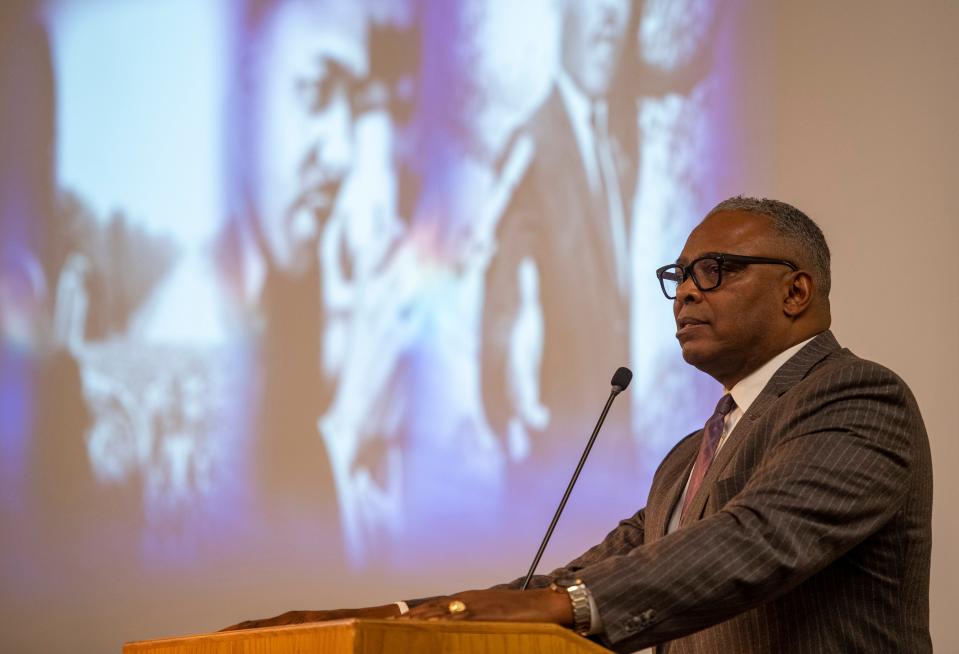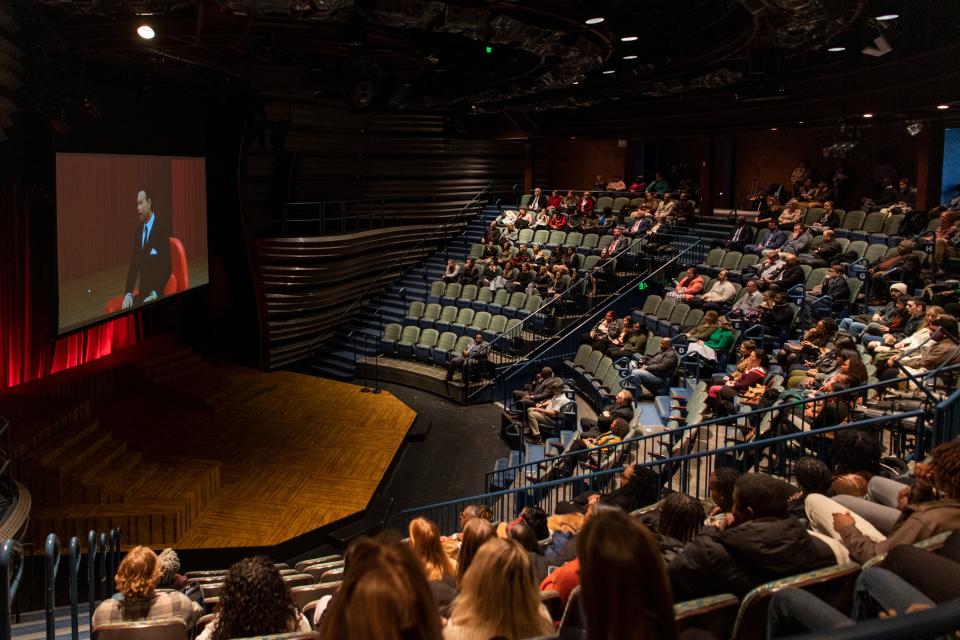Retired general speaks to Martin Luther King Jr.'s legacy at annual USI luncheon
- Oops!Something went wrong.Please try again later.
- Oops!Something went wrong.Please try again later.
EVANSVILLE — A packed audience gathered Monday at the University of Southern Indiana to honor the legacy of Martin Luther King Jr. during an annual luncheon hosted by the university's multicultural center.
Retired U.S. Army Maj. Gen. Barrye L. Price, a renowned writer and speaker on King, civil rights and military affairs, delivered the event's keynote speech. As Price recounted events from King's life, he sought to dispel myths about the Atlanta-born minister and urged the audience to deepen their knowledge of King's activism.
Price has attended the Martin Luther King Jr. Memorial Celebration luncheon before. Other past speakers include Cornell William Brooks, the former president of the National Association for the Advancement of Colored People, or NAACP, and April Ryan, a national political reporter and award-winning author.

After delivering his speech, Price previewed a new animated short film he financed and produced, titled, "Interview With A King." The film leverages artificial intelligence and voice acting to portray an on-stage interview with King, who answers questions about his work and upbringing in the first person.
Newly inaugurated Evansville Mayor Stephanie Terry, the first person of color and woman to hold the city's highest office, attended the luncheon, as did City Councilman Alex Burton, D-Fourth Ward.
Alison Buchanan, the artistic director of the London-based Pegasus Opera Company, opened the event with a halting vocal performance. USI announced Monday that Buchanan, the only Black British woman to direct an opera company in the United Kingdom, would speak and teach at USI ahead of the university's inaugural performance of Ruth later this month.
Dr. Pamela F. Hopson, the executive director of USI's Multicultural Center and an organizer of the annual luncheon, spoke soon after Buchanan departed Carter Hall's main stage.
"If you didn't feel it, you're still asleep," Hopson said about Buchanan's singing. Regarding Terry's mayoral victory, Hopson kept it short and to the point: "Historic. That's all I'm going to say."
USI President Dr. Ronald S. Rochon, the fifth person to hold the office and the only Black man to do so, delivered an impassioned speech introducing Price, whom he knows personally.
Rochon described traveling to the Edmund Pettus Bridge in Selma, Alabama, with Price during a week-long trip to learn more about the civil rights struggles that shaped America.
"This bridge, as many of you all know, has a great deal of history," Rochon said. "In 1965 on March 7, there were over 600 people that occupied that bridge, fighting for the constitutional right for African Americans to vote."
The peaceful protesters were met by police armed with billy clubs and teargas as they marched from Selma to Montgomery, Alabama, during an affair often referred to as "Bloody Sunday."
"I want you to understand the significance of our collective American history so that we can actually move toward a brighter and a more prosperous day," Rochon said. "Our world right now is upside down. We have war, we have division, we have children who are losing their parents all across the globe... Students, I promise you, you are the reason my optimism rides every single day."

Price dispels King myths and previews new film at USI
Hopson first announced the luncheon's keynote speaker in December by drawing parallels between King and Price, who graduated from the University of Houston's College of Business Administration in 1985 and went on to achieve a storied career in the military, where he was awarded the Bronze Star, among other medals.
Price is the president and CEO of the Community Anti-Drug Coalitions of America, and he served on the President's and First Lady's Task Force on Raising Responsible and Resourceful Teenagers in 2000 and contributed to President Bill Clinton's Mississippi Delta Task Force from 1999-2000.
"As we celebrate the life and accomplishments of Dr. Martin Luther King, Jr., it is befitting that we have Maj. Gen. Barrye L. Price as our keynote speaker,” Hopson wrote in a December news release. “Both leaders represent peace and inspiration. Regardless of the circumstances in their life, they have never given up.”
Price took the stage Monday with vigor, joking that he had asked Rochon to ensure he was "the tallest man in the room" only for Rochon to invite USI's men's and women's basketball teams to attend his speech.
Price quickly pivoted to the topic at hand: the life and legacy of King.
What did the audience truly know about the man who so often found himself at the center of America's mid-century civil rights movement? Price asked the rhetorical question before providing a potential answer.
"90% of you would say he's a dreamer," Price stated. "Or that he's the guy who gave the 'I Have A Dream Speech' in August of 1963, and you'd be right."
But there's more to King's life that most Americans don't know, Price argued, including the backstory behind his most famous speech's titular phrase, "I have a dream." King delivered multiple versions of the speech at various venues before the March On Washington, and King's oratory emphasis on the phrase "I have a dream" diverged from his prepared script, Price said.
"Mahalia Jackson had heard him (King) give that speech in Detroit, at Detroit's Cobo Hall in June of 1963, and she's listening to his speech and she said, 'What?... Tell them about the dream!'" Price explained. "And finally, he relented, and he talks about the dream."
Price went on to describe how King leveraged the philosophical teachings of Henry David Thoreau, Immanuel Kant, Mahatma Gandhi and other thinkers and spiritual leaders to synthesize his vision for a non-violent movement aimed at taking direct action to end racial segregation and bigotry.
King's philosophy and work, forged through experience living and preaching in the Jim Crow South, went on to earn him audiences with presidents and placed him in the right place at the right time to advance pivotal civil rights legislation, Price said.
The retired general also highlighted a tension between King's relatively prosperous upbringing in Atlanta and his later role as a leader and icon for America's downtrodden and oppressed.
"He's an unlikely champion for the underprivileged," Price said. "King lived a life that privileged people envied. He wasn't poor. He grew up in a nine-room gingerbread (style) house... His father had national renown."
But King took up the work of propelling the civil rights movement forward, often with help from his wife, Coretta Scott King, and in the face of oppression: Price noted that King was jailed more than 30 times and, at one point, had to call on John and Ted Kennedy to free him from detention.
Keeping with the theme that many Americans know little about King beyond his most storied achievements, Price highlighted the intense personal strain King's work placed upon him, painting a portrait of a man beset by pressure from all sides.
"He was hospitalized for exhaustion, for depression 16 times," Price said. "Did you know that towards the end of his life, he developed a nervous tic because he was afraid that his life would end like Malcolm X and John Kennedy?"
King's fear would prove fateful on April 4, 1968, when James Earl Ray fatally shot King as he stood on a balcony at the Lorraine Motel in Memphis, Tennessee. In an instant, an assassin's bullet cut short one of modern America's most impactful lives.
Price has in recent months sought to reanimate King's life and legacy with help from artificial intelligence and voice acting from Dr. Stephon Ferguson, who is sanctioned by King's estate to impersonate him. The result is a new short film that Price previewed after his speech.
"He sounds exactly like him," Price said of Ferguson. "And then we use AI and animation to build this 37-minute movie."
True to promise, a reanimated King is seen in the film walking onto a stage and answering questions from an interviewer about his upbringing, activism and philosophy.
The film, which is titled, "Interview With A King," draws on primary source material to craft King's words, Price said.
"I'm probably the most unlikely person to champion the rights of the underprivileged, as many would undoubtedly look at my life and upbringing and declare it untypical of most negros and most Americans for that matter," the animated King says at the film's outset.
Ferguson, voice acting as King, goes on to recount personal stories about King's first experiences with discrimination in Georgia and his motivations for taking up civil rights work.
Price, Rochon, Hopson, and student speakers at the luncheon were united in their position that such work is as important today as it was during King's life.
"I just want to thank you for continuing to set the tone for what we need in order to keep that flame alive and not allow it to become a flicker and go out," Hopson said to Price.
And Hopson, ever the educator, took notes during Price's speech. One theme, in particular, struck her as both timely and important: Hopson urged the luncheon's attendees to "step out of their comfort zone" and "meet people where they are," just as King did.
Houston Harwood can be contacted at houston.harwood@courierpress.com
This article originally appeared on Evansville Courier & Press: University of Southern Indiana Martin Luther King luncheon 2024

